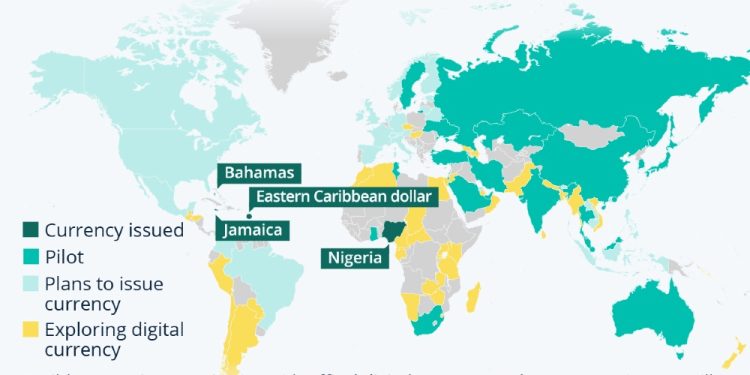Editor’s Note: One might look at the chart below and come to the conclusion, “Oh, that’ll never happen here.”
Think again. It can and almost certainly will happen here if we do not do whatever it takes to stop it. Generally, I’m not a fan of recommending we need to vote our way out of a situation, but considering the vast array of enemies who are pushing Central Bank Digital Currencies, I’m not sure if there’s a non-political or legal way to stop them. With that said, it would behoove us all to assume the worst and hope for the best when it comes to these abominable control mechanisms taking hold in the United States. Here’s Tyler Durden…
Central bank digital currencies are controlled by governments like traditional currencies are and therefore represent the polar opposite of the idea of decentralized, self-sovereign bitcoins.
As Statista’s Katharina Buchholz reports, several small nations and – since October 2021, Nigeria – have launched central bank digital currencies, and several more populous countries are getting ready to jump aboard a different crypto hype train.
 You will find more infographics at Statista
You will find more infographics at Statista
The European Union today is proposing a legal framework for its planned launch of the digital euro. According to the Central Bank Digital Currency Tracker by Atlantic Council, concrete plans to launch a CBDC were also recorded in Canada, Brazil and the United States, among others.
Countries which are already in a CBDC pilot phase include Russia, Thailand, India, South Korea, Sweden, the United Arab Emirates and Saudi Arabia, according to the source. It is unclear, however, which of these programs could see a proper launch next.
CBDCs were introduced even earlier than in Nigeria in Caribbean countries, for example in the Bahamas and nations and territories that share the currency of the Eastern Caribbean dollar. The Sand Dollar of the Bahamas was the first central bank digital currency of the world upon its launch in 2019 and cleared the way for a rapid adoption around the region’s small nations.
The Chinese digital Yuan pilot made headlines in April 2019, but the project has not moved on since. Like Nigeria, China has a solid digital and mobile payment infrastructure. Large parts of the two countries’ populations leapfrogged card payments and went straight from cash to digital payment options, which became hugely popular – may they be app or text-based. In developing countries, central banks also consider the potential of digital currencies reaching the unbanked.
Another reason for some governments to champion official digital currencies is the collection of data.
Ubiquitous digital payments and tight government surveillance have led to a plethora of payment data already available to Chinese administrators. This knowledge on how people spend money will only grow with the implementation of the digital Yuan, even though the country’s central bank has said it will limit traceability and create what it calls “controllable anonymity.”
These aspects of digital currencies are viewed negatively by Europeans, who according to a survey by the European Central Bank are concerned about payment privacy in regards to the digital euro.
Article cross-posted from Zero Hedge.
What Would You Do If Pharmacies Couldn’t Provide You With Crucial Medications or Antibiotics?
The medication supply chain from China and India is more fragile than ever since Covid. The US is not equipped to handle our pharmaceutical needs. We’ve already seen shortages with antibiotics and other medications in recent months and pharmaceutical challenges are becoming more frequent today.
Our partners at Jase Medical offer a simple solution for Americans to be prepared in case things go south. Their “Jase Case” gives Americans emergency antibiotics they can store away while their “Jase Daily” offers a wide array of prescription drugs to treat the ailments most common to Americans.
They do this through a process that embraces medical freedom. Their secure online form allows board-certified physicians to prescribe the needed drugs. They are then delivered directly to the customer from their pharmacy network. The physicians are available to answer treatment related questions.





